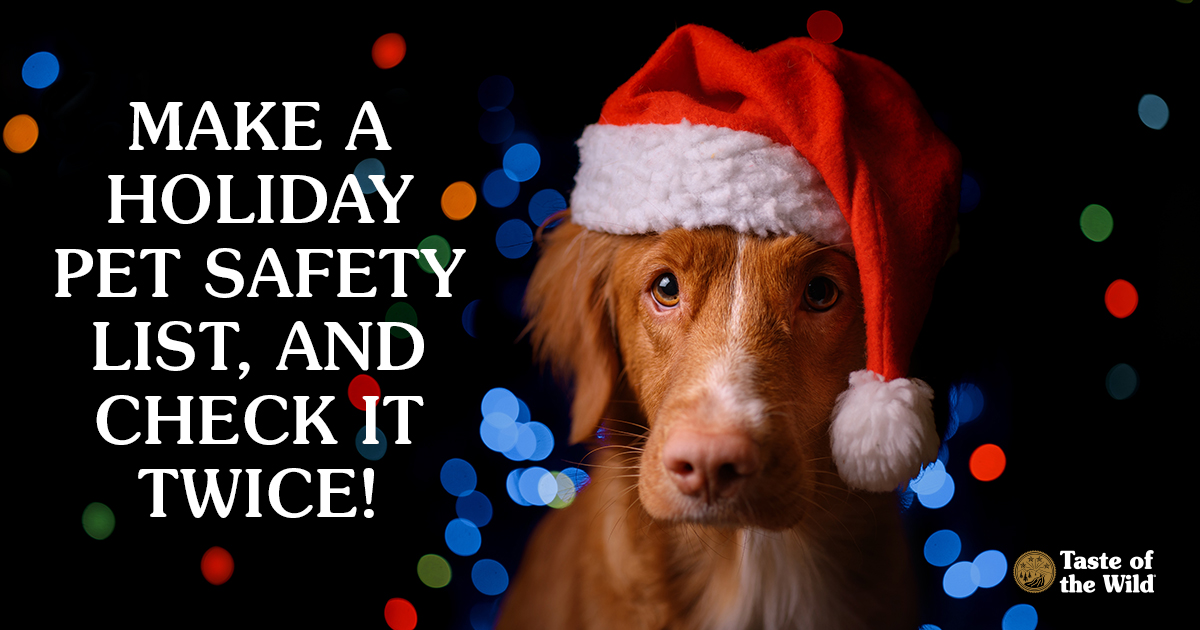
The tinsel is pretty. The candles and tree sure smell nice. But for every nice touch we add to our homes during the holidays, there’s an accompanying worry when it comes to pet safety.
Have you hidden all potential holiday toxins and dangers out of your pet’s reach? To help protect your pet this season, we’ve compiled a list (and checked it twice!) of things you should consider when decorating the house or otherwise celebrating.
Silica gel packs
Usually packaged with electronics, food and other gifts, silica gel packs are designed to absorb moisture during storage. If your pet breaks open the pack and eats the granules, it may lead to mild gastrointestinal upset — usually nothing to worry about. The real danger, especially for smaller pets, is if they consume the whole pack, which could cause a digestive tract blockage.
Christmas tree water
Does your pet like to lap water out of the tree stand? If you use a tree preservative in the water, it’s usually made of diluted sugar and fertilizer. While this probably won’t cause anything more than an upset tummy, why risk it? Tap water should be enough to satisfy a thirsty tree.
Other tree dangers
Many cats can’t resist climbing trees — especially the decorated kind. So if you don’t want yours crashing to the floor, set up barricades around the tree or secure the tree to the wall so it can’t tip over on your cat. Chewing on the tree or needles can lead to appetite loss, vomiting and intestinal blockage. Gnawing on a string of lights can result in electrical shock — so make sure to tape cords to the floor and keep lights away from low branches.
Tinsel, ribbons and ornaments
Tinsel, yarn and ribbons are problematic for all pets, but especially for cats. One end of the string can become wrapped around the tongue or caught elsewhere in the digestive tract. The intestines may then “accordion” around the string and perforate, which can be fatal. If you see your pet trying to pass tinsel or ribbon, do not pull on the end, but do call your veterinarian.
If ornaments are swallowed, they can become lodged in the digestive tract and sharp edges may cause internal damage. Any ornament that could be potentially swallowed should be hung from higher branches, out of your pet’s reach.
Batteries
A lot of great gifts are battery-powered, and some batteries are small enough for your pet to chew. When batteries are punctured or swallowed, the alkaline or acidic contents can leak out, leading to serious corrosive burns to the mouth, esophagus and other parts of the digestive system.
Candles
Keep the menorah or other lit candles out of your pet’s reach to prevent burned hair, whiskers or skin. And never leave lit candles unattended where a pet can inadvertently knock them over and start a fire.
Mistletoe
If your dog or cat nibbles on a small amount of mistletoe, it may experience mild drooling or vomiting. However, pets that consume larger amounts may have difficulty walking, have seizures, collapse and even die.
Holly
All parts of the holly plant are considered toxic, but the prickly leaves usually prevent pets from eating too much. Ingestion can lead to lip smacking, drooling, vomiting, head shaking and loss of appetite. If signs are severe, see your veterinarian.
Poinsettias
Although these colorful plants have a reputation for being poisonous, they rarely are. Nibbling on the plant may lead to mild drooling, loss of appetite, vomiting or diarrhea. Typically, if you withhold food for a few hours to give your pet’s tummy a chance to rest, the signs will resolve on their own. Medical treatment usually isn’t necessary unless the signs are severe and persistent. In those cases, call your veterinarian.
Be prepared
Despite your best efforts, your pet may get into something it shouldn’t. Take the time now to program important numbers into your phone, including those for your veterinarian, the local emergency veterinary hospital and the ASPCA Animal Poison Control Center (888) 426-4435. When in doubt, call the experts — don’t waste time searching the internet for answers.
We all want to keep our pets safe over the holidays. After all, isn’t a happy, healthy pet the best gift of all?
The information in this blog has been developed with our veterinarian and is designed to help educate pet parents. If you have questions or concerns about your pet's health or nutrition, please talk with your veterinarian.
